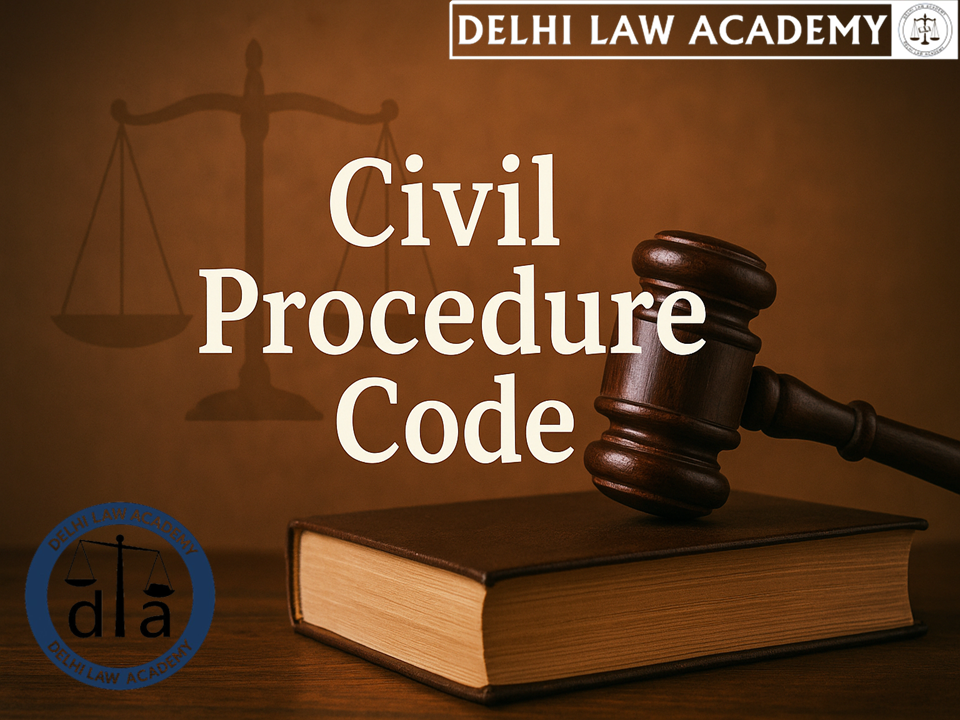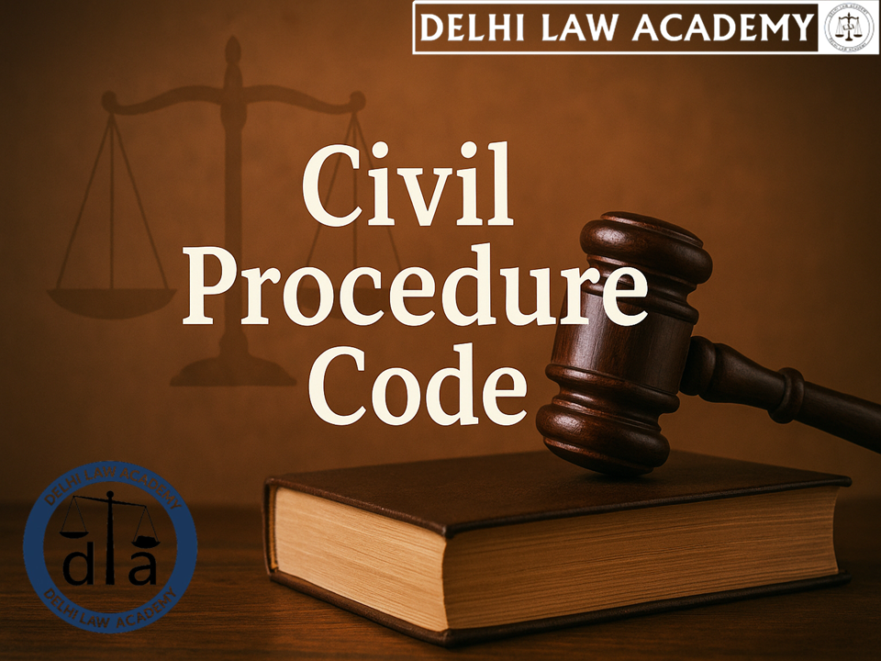
📘 CIVIL PROCEDURE CODE : INHERENT POWERS OF COURT
⚖️ SECTION 151 CPC
📚 TOPICS
- Saving of inherent powers of Court
- Amendment of judgments, decrees or orders
- Place of trial to be deemed to be open Court
🏛️ Supreme Court Judgment Considered
In the matter of inherent powers of Court under Section 151:
- Salem Advocates Bar Association v. Union of India [2005 SC]
🧾 Decision of the Supreme Court
- The upper limit fixed in Section 148 cannot take away the inherent power of the Court to pass orders as may be necessary for the ends of justice or to prevent abuse of process of Court.
- The object of the Code is not to promote failure of justice.
🎯 Preparation for RJS, DJS, PCS(J) and Other Judicial Service Exams
CIVIL PROCEDURE CODE EXPLAINED:
The Civil Procedure Code forms the bedrock of any and every Judicial Service exam in the country. Its thorough knowledge is a must for all aspirants of RJS, DJS, PCS(J) and every other Judicial Service exam. To help such aspirants, DELHI LAW ACADEMY JAIPUR has launched a series of study material modules on all important aspects of this vital part of their syllabus.
⚖️ Saving of Inherent Powers of Court – Section 151
- Nothing in this Code shall be deemed to limit or otherwise affect the inherent power of the Court to make such orders as may be necessary for the ends of justice or to prevent abuse of the process of the Court.
An example of the inherent power:
• An amendment in Section 148 w.e.f. 1.7.2002 affects the power of the Court to enlarge time that may have been fixed or granted by the Court for the doing of any act prescribed or allowed by the Code.
• The amendment provides that the period shall not exceed 30 days in total. Before this amendment, there was no such restriction of time.
Question:
• Whether the Court has no inherent power to extend the time beyond 30 days is the question.
Answer from Supreme Court:
• We have no doubt that the upper limit fixed in Section 148 cannot take away the inherent power of the Court to pass orders as may be necessary for the ends of justice or to prevent abuse of process of Court.
• The rigid operation of the section would lead to absurdity. Section 151 has, therefore, to be allowed to fully operate.
• Extension beyond maximum of 30 days, thus, can be permitted if the act could not be performed within 30 days for reasons beyond the control of the party.
• We are not dealing with a case where time for doing an act has been prescribed under the provisions of the Limitation Act which cannot be extended either u/s 148 or 151.
• We are dealing with a case where the time is fixed or granted by the Court for performance of an act prescribed or allowed by the Court. There can be many cases where non-grant of extension beyond 30 days would amount to failure of justice.
• The object of the Code is not to promote failure of justice. Section 148, therefore, deserves to be read down to mean that where sufficient cause exists or events are beyond the control of a party, the Court would have inherent power to extend time beyond 30 days.
Authority: Salem Advocates Bar Association v. Union of India [2005 SC]
📝 Amendment of Judgments, Decrees or Orders – Section 152
- Clerical or arithmetical mistakes in judgments, decrees or orders, or errors arising therein from any accidental slip or omission, may at any time be corrected by the Court either of its own motion or on application of any party.
🏛️ Place of Trial to be Deemed to be Open Court – Section 153B
- The place in which any Civil Court is held for trying any suit shall be deemed to be an open Court to which the public generally may have access so far as the same can conveniently contain them.
- Provided that the presiding Judge may order, at any stage of inquiry into or trial of any particular case, that the public generally or any particular person shall not have access to or remain in the room or building used by the Court.
📚 Continue Your CPC Preparation
Don’t stop here! Strengthen your knowledge of the Civil Procedure Code with our other fully solved tests:
📘 Free Study Material for Judiciary Aspirants!
Download our FREE study material prepared by Delhi Law Academy’s expert faculty.
❓ Frequently Asked Questions on Section 151 CPC (Inherent Powers of Court)
⚖️ What are the inherent powers of the Court under Section 151 CPC?
Section 151 CPC preserves the inherent powers of the Court to make such orders as may be necessary for the ends of justice or to prevent abuse of the process of the Court.
It ensures that technicalities do not override fairness and justice during judicial proceedings.
🧾 Can the Court extend time beyond 30 days under Section 151 CPC?
Yes ✅. In Salem Advocates Bar Association v. Union of India (2005), the Supreme Court held that the 30-day upper limit in Section 148 CPC does not restrict the inherent powers of the Court.
The Court can extend time beyond 30 days when justice demands or circumstances are beyond the control of a party.
📜 What is the difference between Section 148 and Section 151 CPC?
Section 148 CPC provides a specific limit (up to 30 days) for extension of time granted by a Court.
Section 151 CPC, on the other hand, gives the Court broad inherent powers to act in the interest of justice, even beyond the 30-day limit when necessary.
⚖️ Can inherent powers under Section 151 CPC override express provisions of the Code?
No 🚫. Section 151 CPC cannot be used to override or contradict express provisions of the Civil Procedure Code.
It is only meant to fill gaps where no specific provision exists, ensuring justice and preventing abuse of process.
🧠 What is an example of using inherent powers under Section 151 CPC?
A typical example is when a Court allows amendment of pleadings or extension of time even after the expiry of the statutory limit,
if denying it would lead to injustice. Courts have invoked Section 151 CPC in such cases to serve the ends of justice.
🏛️ Is Section 151 CPC relevant for Judicial Services Exams like RJS or DJS?
Absolutely ✅. Questions on Section 151 CPC and the Supreme Court case Salem Advocates Bar Association v. Union of India (2005)
are frequently asked in RJS, DJS, and PCS(J) exams. A clear understanding helps aspirants write precise and analytical answers.
Contact us
📍 Delhi Law Academy – Jaipur Branch
6C, Tower 2, Coaching Hub, Pratap Nagar, Jaipur – 302033
📞 Phone:
+91 9911916552
+91 8447285606
✉️ Email:
contactus@delhilawacademy.com

